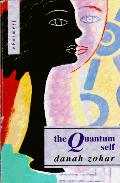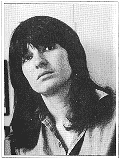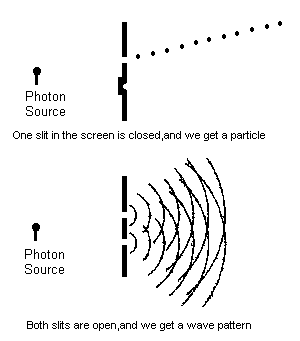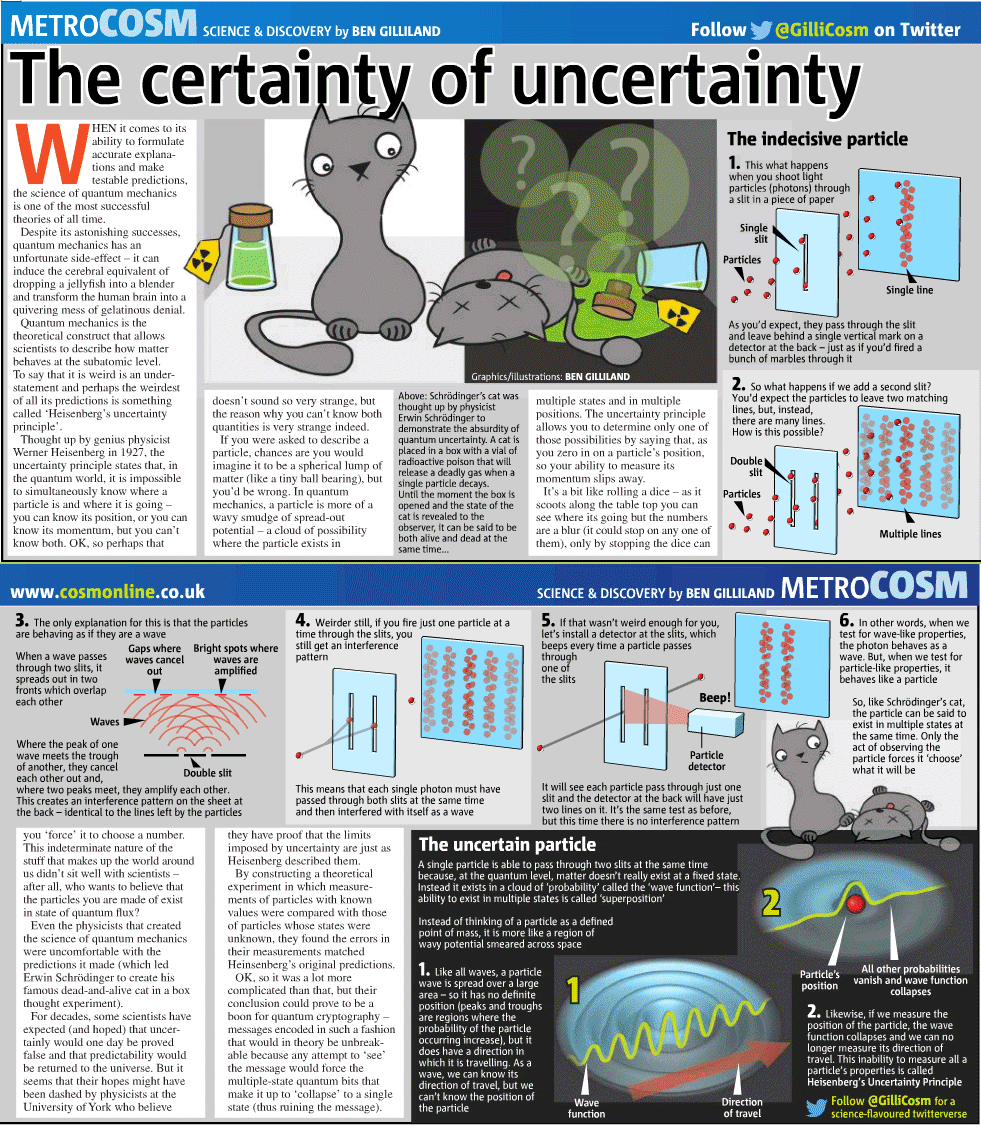The Quantum Self
 |
 |
Danah Zohar
Chapter 4:Are Electrons Conscious?
The problem of Schrödinger's cat [Ref: [Science 1] J.Gribbin "Schrödinger's Cat"] raises the conundrum of the conscious observer's participation in reality formation and suggests that this may be an issue for physics itself. But this in turn raises problems, problems which affect our attitude towards biology,psychology, philosophy and religion - the whole vast range of disciplines which have as their goal any understanding of human beings and our place in the universe. Physics today is at the centre of our concerns, and the problem of consciousness within physics one of the most central of all.
But,whereas what the observer sees can be described in the equations of quantum mechanics,the observer himself cannot. We don't have any equations for observers, human or otherwise. They are outside the quantum system. Thus, ironically, while urging us to transcend the old observer/observed duality,quantum physics as presently written actually sustains it.It is somehow awkwardly incomplete and will remain so until it can take account of observers and,in the case of human ones at least, the consciousness with which they make their observations.
Yet the consciousness which has become an issue for physics may be more than just human consciousness. When considering the plight of Schrödinger's cat,why shouldn't we consider how his odd predicament seems to, or is affected by, the consciousness of cat himself? Or to that of a flea in his ear? Or, outrageous as the question may seem at first, to that of the radioactive decay particle that determines whether he lives or dies?
Something broader than the issue of man alone, or of man's relationship to matter, may be at stake. Something about the behaviour of fundamental reality as expressed in the new physics almost demands that we reassess the whole question of consciousness, not just as it relates to ourselves but also as it may relate to other creatures and things in the universe - perhaps, as we shall see, even to the most elementary constituents of matter.
On the whole, the Judaeo-Christian tradition which informs much of our Western
cultural and self-awareness has set man apart as something unique, certainly
in this world and possibly in the universe as a whole. According to this
tradition, God made all the creatures of the field each after its own kind,
but He made man in His own image and gave him dominion over all the earth.
1 Man owed his special position not to his body, which consisted of mere
'clay', but to his possession of a soul [Ref: A.Clare "Soul" Video:H1]- in
modern terms, his consciousness - which in some way mirrored that of the
Divine Being. In modern philosophical terms all this was clarified and passed
on to us in Descartes' mind/body dualism, in the splitting of reality into
thinking substances (res cogita) and into purely mechanical, extended
substances (res extensa).
Given faith in such a transcendent deity, it matters less that man's soul, or consciousness, bears little relation to anything else in this world. At one with God, what need have we of communion with the beasts and things ? 'My kingdom is not of this world.' 2
But with the advent of modern science in the seventeenth century and the slow but relentless withdrawal of the transcendent deity from the scheme of things, our human consciousness seemed no longer to mirror anything but itself. Without the Christian god,without faith in a transcendental kingdom of the soul and blind to the 'soulfulness' (consciousness) of creatures and things, atheistic Cartesian dualism' * left us with nothing but crude materialism. A sense of being unique because chosen gave way to the more familiar twentieth-century sense of alienation: We are distinct from everything around us and inexorably alone. For some time it was even the vogue amongst modern psychologists and philosophers - the behaviourists and positivists and the linguistic analysts - to respond to this alienated uniqueness by denying its raison d'être, by denying the importance of consciousness altogether and the relevance of the whole world of subjective thought and emotion.
* Descartes himself, of course (like Newton), Was a believing Christian, so for him Cartesian dualism was not the spiritual problem that it became for later generations.
The time seems to have come when psychology must discard all reference to consciousness; when it need no longer delude itself into thinking that it is making mental states the object of observation
.....Psychology as the behaviourist views it is a purely objective, experimental branch of natural science which needs introspection as little as do the sciences of chemistry and physics.3
Ironically,this kind of thinking is now outdated for physics as it was crippling for psychology.
The Cartesian world-view was necessary to the cultivation of Newton's physics and all the technological progress that flowered in its wake,but in a post-Christian culture it is both philosophically and spiritually barren.While the soul of modern man cries out for more,for some sense of fellow feeling with something beyond ourselves, for a sense of being at home in the universe [Ref: R.Dawkins RI Lecture Video:A20], our reason,too,demands that we make better sense of our experience. Consciousness is a fact of that experience,and philosophy or a science which can't account for consciousness is a necessarily incomplete philosophy or science. This has become almost a home truth to quantum physicists struggling to make some sense of developments in their own field, but it has yet to percolate into our general intellectual outlook.
What, then,if both Christianity and pre-quantum modern science have got it wrong? What if man is not unique ? What if, after all,we share to some extent our being conscious with other things and other creatures in this universe - perhaps with the universe itself?
Such questions become impossible to ignore if we take into account the knowledge of modern biology, or take seriously suggestions by philosophers and physicists like Alfred North Whitehead and David Bohm that even elementary subatomic particles might possess rudimentary conscious properties.
Before going on in later chapters to explore the nature of human consciousness,its possible physics and the resulting psychological and moral implications of this, it would be useful here to reappraise the question of where conscious beings as a whole fit into the general scheme of things. What can we say now about this 'consciousness' that we keep referring to and who else - or, extraordinary as it may sound, what else - has it? Are we human beings really distinct from everything else, as mainstream Western tradition has held, or is our consciousness in some important sense continuous with other things in the universe? And if continuous,how far does this continuity extend? To dogs and cats? To amoeba? To stones? Or even to electrons? In even beginning to think like this we are experiencing something of a paradigm shift.
Other Living Things
Only the most extreme advocates of human uniqueness would deny the conscious life of familiar mammals like dogs and cats.They are clearly not anaesthetised (insensible) - the most bare bones criterion of something's being conscious.They move about engaging in spontaneous and purposive activity,they have an undoubted capacity to enjoy pleasure or feel pain,they learn from their environment and adapt to it,and they are at least to some extent in possession of free will - they can,and do,make choices.All of these things we commonsensically associate with consciousness in human beings.Whether dogs and cats also enjoy,as we do,an "inner life" or possess a sense of "I",is a moot point with advocates on both sides,but we generally have no difficulty in feeling they are fellow conscious beings.
As we move further away from the common mammals encountered in daily life,or further down the phylogenetic scale,the sense of fellow feeling becomes less gripping.Arguments from analogy - we are conscious,therefore things that are like us must be conscious - lose their force as increasingly stranger creatures appear to be not very much like us at all.This is one of the problems raised by philosopher Thomas Nagel in his much-discussed essay,"What Is It Like To Be A Bat?". When a creature's whole sensory experience and life style are so different from our own,it becomes difficult for us to know "what it is like to be" (Nagel's famous criterion for consciousness -"But fundamentally an organism has conscious mental states if and only if there is something that it is like to be that organism - something it is like for the organism.") that creature,ie what sort of inner life it might experience it might have.Nonetheless,if we thought about it most of us would ascribe some sort of conscious life to bats,or ants,or possibly even to earthworms;and biologists,whose experience of these things is wider than most,are willing to go further still,easily seeing such organisms as amoeba and sea anenome as fellow conscious creatures.
"The writer is thoroughly convinced," says H.S.Jennings in W.H.Thorpe's classic study of animal behaviour,"after a long study of the behaviour of Amoeba,that if Amoeba were a large animal,so as to come within the everyday experiences of human beings,its behaviour would call forth to its states of pleasure and pain,of hunger and desire,and the like,on precisely the same basis as we attribute these things to the dog." Thorpe himself goes on to say that," the behaviour of even a sea anenome is vastly more complicated than supposed.Not only is there a great deal of spontaneous movement but there are elaborate patterns of apparently purposeful activity",all of which,he points out,would be easily available to any of us if we viewed the creature's activities on speeded-up film.
Further evidence that lower animals,which are outwardly quite different from ourselves,none the less possess some sort of conscious awareness that operates on similar principles to our own was suggested recently by studies of the effects of common surgical anaesthetics (halothane,chloroform,etc) on the behaviour of great pond snails.when exposed to the same anaesthetics,the snails were found to lose their withdrawal reflex in the presence of pain stimuli.
For our part,it is probably safe,even on present evidence,to assume that when we speak of consciousness we speak of a "property" or a process that we human beings share,at least to some degree,with all other members of the animals kingdom.This assumption embraces the intuitive feelings that many of us have towards other animals,and it accepts the possible validity of philosophical arguments from analogy.
Thus,in varying degrees of quality and complexity,we can grant that all other animals are in some sense aware,capable to some degree of spontaneous and purposive activity,sensitive to stimuli something like pleasure and pain,and in possession of some rudimentary capacity to exercise free will (To list the possession of free will as a necessary criterion of something's being conscious is,of course,controversial;but it will be argued in Ch12 that consciousness - viewed as a quantum mechanical process - and free will are indeed inseparable.A quantum self is necessarily a free self). In the most primitive sense possible,possession of this set of qualities would also imply some sort of subjective "inner life" on the part of other animals -every creature must have its own "point of view".Acceptance of this might well affect our moral stance towards creatures other than ourselves.

Fig 4.1 The photon seems to "know" how many slits are open.
| Quantum Shadows |

